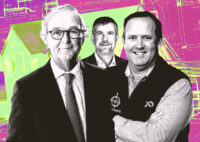While Los Angeles rebuilds after the January wildfires devastated the Pacific Palisades and Altadena regions, some of its wealthy residents aren’t returning; they’re starting fresh in the Lone Star State.
The state’s business-friendly environment has long lured Californians to Texas, but the recent natural disaster has been a catalyst for affluent Angelenos feeling disillusionment with L.A. leadership, a desire to live in a more conservative state and a yearning for closer ties with neighbors, realtors said.
“Everybody feels like it was not handled and addressed properly, that it wasn’t properly prepared for,” said L.A. development adviser Hana Cha, founder of Advisory Studio by HANA. It’s like, “OK, what do you mean there’s no water in the fire hydrants?”
Dallas-based Pogir Pogir of Briggs Freeman Sotheby’s International Realty said that Palisades clients he’s met with are especially attracted to upscale neighborhoods like Highland Park and University Park, where the median listing home price is $3.5 million and $2.4 million, respectively, according to Realtor.com. Meanwhile, the median listing home price in the Palisades is $6.4 million.
Although home prices are not as big of a concern for the more wealthy, they do play a part in general migration patterns of Californians to Texas. Between 2009 and 2023, nearly half a million Californians moved to Texas, with cheaper housing being a main draw, according to a recent Realtor.com report.
Berkshire Hathaway HomeServices’ Matt McIntyre’s clients — a couple under 40 — sold their home in Pasadena and moved to Dallas, even though their home was not directly affected by the wildfires.
“I don’t know that it was a direct result of the wildfire, but I do think the Eaton fire gave them that moment of pause,” McIntyre said. “They thought, ‘This might be the right time.'”
In the aftermath of the fires, Angelenos are blaming local government, Pogir said.
“They want to get away from it because they just don’t see it improving,” he said.
Frustration also comes from Los Angeles’s red tape, according to Cha. Texas is an attractive alternative, given that development in the state takes less time, she said.
Texas is meeting the intense demand for housing with a building boom, meanwhile, it took two months for L.A. to approve permits to rebuild just three homes in the Palisades.
“We have a conversation about building something for 10 years and then it’s like, OK, but it’s not gonna happen,” Cha said. “In Texas, they talk about it for 10 days and they have a shovel in the ground in 10 months.”
Local municipalities in Texas are “very pro-development,” said Catherine Lee, Douglas Elliman’s president of new development in Texas. “Our cost of construction tends to be lower … So you’re starting to see an influx of developers that are out-of-town developers coming into Texas because they can make those numbers make sense.”
A big part of the issue is zoning, said Jim Jacobson, senior vice president of sales in California for Douglas Elliman’s development marketing group.
“Texas has more lenient zoning laws, which creates opportunities, where California doesn’t,” he said.
He cited working with the California Coastal Commission on seaside developments as a “whole other level of bureaucracy.” For some of the projects he’s working on, “I’ll be retired by the time they go for sale,” he said. “We’re talking seven to eight years down the road. It’s pretty crazy.”
Dallas-Forth Worth permitted more housing than all of California last April, according to a Pacific Research Institute report, which attributes the gap to better urban planning, occupational-licensing policies and a lower cost of living in Texas.
Some wealthy L.A. residents are moving to Texas for the red state’s conservative culture, specifically a perceived emphasis on family values and a strong police presence, according to multiple real estate agents.
This comes despite the fact that violent crime is down in L.A., according to the Los Angeles Police Department’s 2024 end-of-year crime statistics.
Pogir shared one incident in which Dallas police notified his out-of-town client that their water was running more than usual and discovered a running toilet; he said this situation would be unlikely in L.A.
“We have a very strong, very good police force in Highland Park, University Park,” Pogir said. “They really are on top of things. Their reaction time is incredible.”
In Austin, crime in the city was down through the first part of 2024 after seeing a rise during the pandemic, Austin Police Department data indicates.
“A huge part of my issue was simple safety,” said former Entertainment Tonight host Lauren Zima, who lived in Los Angeles for 10 years before moving to Austin with her husband, former “Bachelor” host Chris Harrison. She said she experienced long wait times when calling the police in Studio City.
“It’s scary to feel like you’ve paid your taxes and done your part, but you aren’t safe where you live,” she said.
Compass’ Carrie Benuska Leinen, a native Angeleno who moved to Austin two years ago and now helps clients make a similar relocation, said she now never feels like she has to lock her doors. The sense of community safety has been a “tradeoff” when it comes to politics in Texas, she said.
“I see myself as a centrist, and I found myself annoyed by the super, uber — I don’t like really extreme on either side — liberal politics,” she said, noting that it felt like it was “shoved down [her] throat” in California.
While she doesn’t stand behind all of Texas’ conservative policies and noted the lack of diversity in certain neighborhoods, she appreciates the freedom from the pressure to be politically correct.
“When I lived in California I felt like there were all sorts of taboo topics,” she said. “I have millennial kids who’d be like, ‘You can’t say that, that’s not OK.’ I feel much less that way here.”
The appeal of conservatism also bleeds into these Angelenos’ perception of the school systems in Texas, said Compass’ Elena Licari. She’s heard that some people with kids are looking to put them in “more traditional” schools.
Beyond concerns with everyday living in L.A., some are exiting the city because they feel there’s nothing to return to post-wildfires and are looking to start new in a state experiencing significant growth.
Pigor said of his clients, “They were not going to stay in the Palisades. They were not going to deal with all that. They have accepted that it’s never going to be the same.”
The quaint architecture of Altadena’s 100-year-old homes “is gone,” Benuska Leinen said. “Altadena is gone, all the businesses are gone, all the houses are gone. … I can just see homeowners saying, ‘I don’t have it in me [to rebuild].’”
Licari, who was a firefighter in San Jose for 17 years before relocating to Austin with her husband, a Bay Area builder, likens the post-wildfire exodus to the migration that happened during the pandemic. In 2021, roughly 110,000 people moved from California to Texas.
“Maybe because the Covid levels were higher in California, people felt scared and people felt on edge,” Licari said. “I think that’s what a lot of my friends and people that are relocating are feeling right now — that there’s a lot of heavy energy in L.A., because there’s been so much loss and there’s so much trauma from what’s happening there, that heaviness they want to escape.”
Read more



